Donna Haraway提出Making kin(製造親緣)的概念,我們提議Making kino (製造電影/製造電影院),也該是一種建立人與人,人與其他物種,人與世界之間的連結,共生相存的演化方式。實驗電影人致力於音像語言的開發,亦是一種建立個人感官與外在世界聯結渠道的手作工程。
While Donna Haraway raised the idea of “making kin”, we propose the idea of “Making Kin(o)”! (making film, making cinema). The kin(o) culture is about interpersonal connection not only between experimental filmmakers, but also between humans, between beings, and between the individual and the cosmos. They build the tunnels between senses and between the outside worlds and the personal affects through new audio visual languages.
現在的實驗電影生在電影與錄像藝術的夾縫中,在被機制不斷拒絕的狀態下,產生極強的韌性與任性。透過這種力量,我們認為,創作並不只是自我完滿的世界觀,個人感官必須跨越各種邊界,構成新的系譜,串連起新的Kin(o)網絡。
Contemporary experimental filmmakers live in the middle of the art world and the film industry. The fluidity to survive between institutions becomes our strength. With this strength, we are not only envisioning alternative self-sufficient visions of the world, but also making transmissions through different boundaries and making it a new context: the new network of Kin(o)!
個人與集體創作可以並行,藝術家與影像創作者與他人/朋友共同jam出的實驗性計畫是個人創作的養分。多數人誤解實驗電影只是材質與電影語言實驗,但實踐過程中的各種化學變化在當代是更重要的實驗精神。我們提議不論藝術或電影製作。都該嘗試暫時拋開影像製作過於強調專業分工導致過於僵硬的生產線,即使是在既有的模組中工作,也該試圖改變自身創作位置。因為一起創作,除了火花、衝突和啟發外,我們不該忘記好玩也很重要。
Auteurism matters, so does co-creation (collaboration). Experimental film is not just a lonely journey of materiality or the cinema language. Experimentation is also crucial. Co-creation can be an occasional escape from the individualism of artistic context, or from the professionalism and efficiency of the labour division in commercial filmmaking modules. What makes it experimental is how friendships, conflicts, inter-inspiring, fun and playfulness transform the process
Kin(o)是一個藝術家/filmmaker自主發起的社群。自主社群來自擁有類似感性的創作者集社(collective)。這個集社不需要具備不間斷的生產力,而是給予創作者修復的空間。創作者們隨著自己的步調朝共同制定的目標前進(或根本不去設定目標)。
Kin(o) is a community initiated and run by the artist/filmmakers. A group of filmmakers, who share similar sentiments, form a collective. A collective does not need to be continually productive but rather restorative. It is important that a collective takes its own pace to meet their desired goals, or even, does not set goals at all.
Kin(o)不排斥來自機制的資源,但有禮貌地做好自己的事情。Kin(o)也會彼此分享主流世界的資源。當一人獲得資源時,他盡力地使資源能夠共享。不過,任何人都不該把他人的善意視為理所當然。
Kin(o) performs their responsibilities while acquiring resources from institutions, but maintains their idealism as much as possible. Kin(o) shares resources. If one is invited to the table of resources, one makes the resources available to kin(o). However, no one should take other’s courtesy for granted.
在現有的產業建制之外,Kin(o)主動提出以創作者為策劃中心的自主放映與其他活動形式,任何地方都可以變成電影院。我們終將不再以國家、國境、獎項為認知作品的分野,也不再區分目標觀眾與策展人的界線,而僅是閱讀每個短篇章裡的獨特性。Kin(o)屬於期盼未來的創作者與尚未成為創作者的觀眾,建立一個自給自足的場域,場域循環並激發影像的可能性。
Kin(o) finds new possibilities outside of the current industrial apparatus. Screenings/events are grassrooted and self-organized by the artists/filmmakers. Anywhere can become a cinema. The work will no longer be identified by countries, borders, awards, but by individuality of each work. There would be no lines between audiences and curators, the space is for image creators and the potential image creators build a substantial, stimulating field for circulating the possibilities of the moving images.
這個空間讓創作者能養育/保存/藏匿自己還不成熟的企劃。若集社體其中一員想另闢新計畫,且需要外援,他也能自由地再組新的集社,並同時留在原來的集社中。同好會以上,公司組織以下,自主社群擁有自由的身份,但也提供參與者持續創作的能量。
This Kin(o), as a space, is for one to cultivate/preserve/hide thoughts and ideas before a project is ready to grow. As individuals do not sync all the time, if a member decides to develop a new path, they are free to form another partnership or collective as they need and desire while still staying in the former collective. Beyond an interest club but not a cooperation, Kin(o) provides freedom and the energy one needs to create.
後照鏡 ReaRflex
September 2021
(第三版)
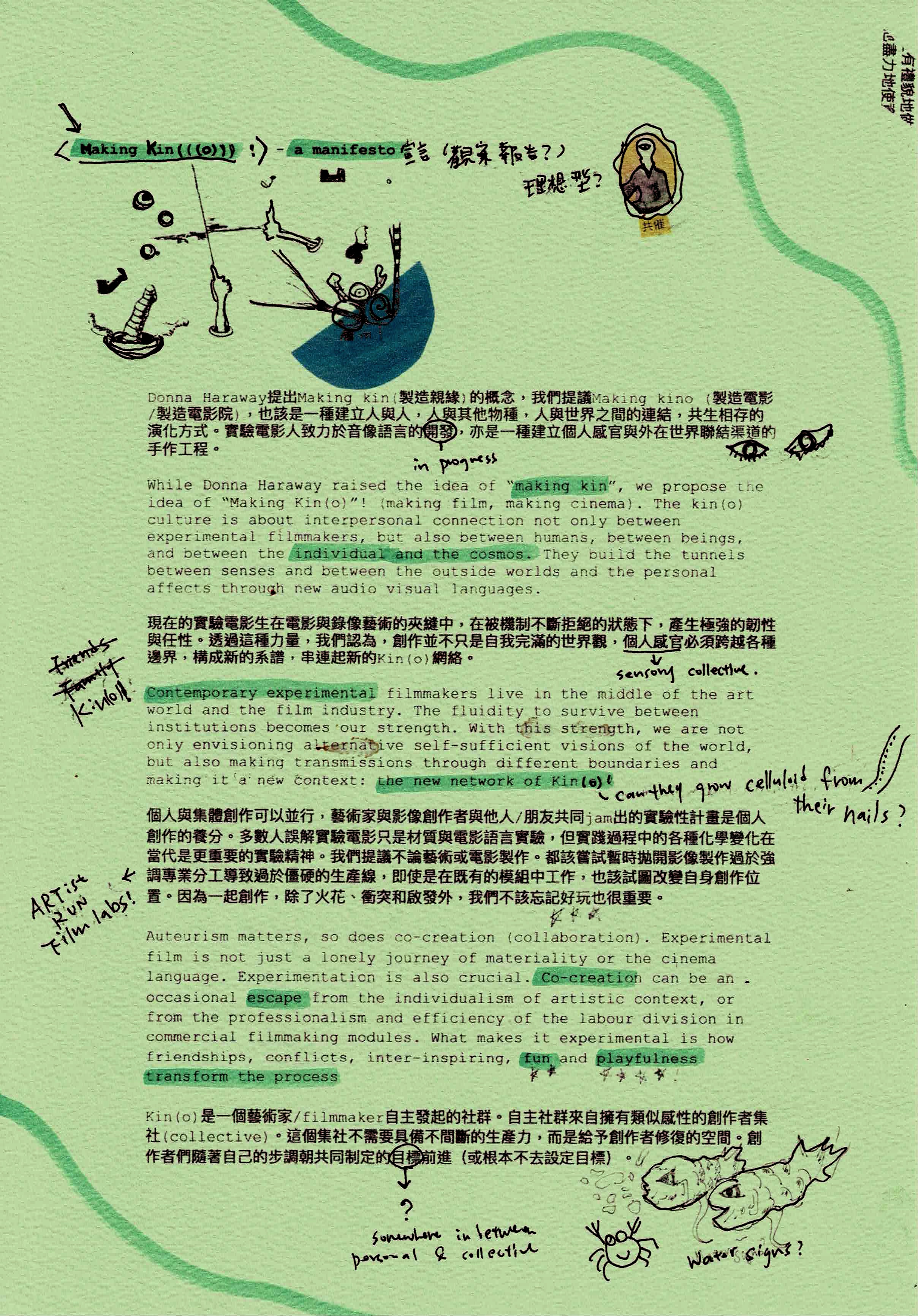
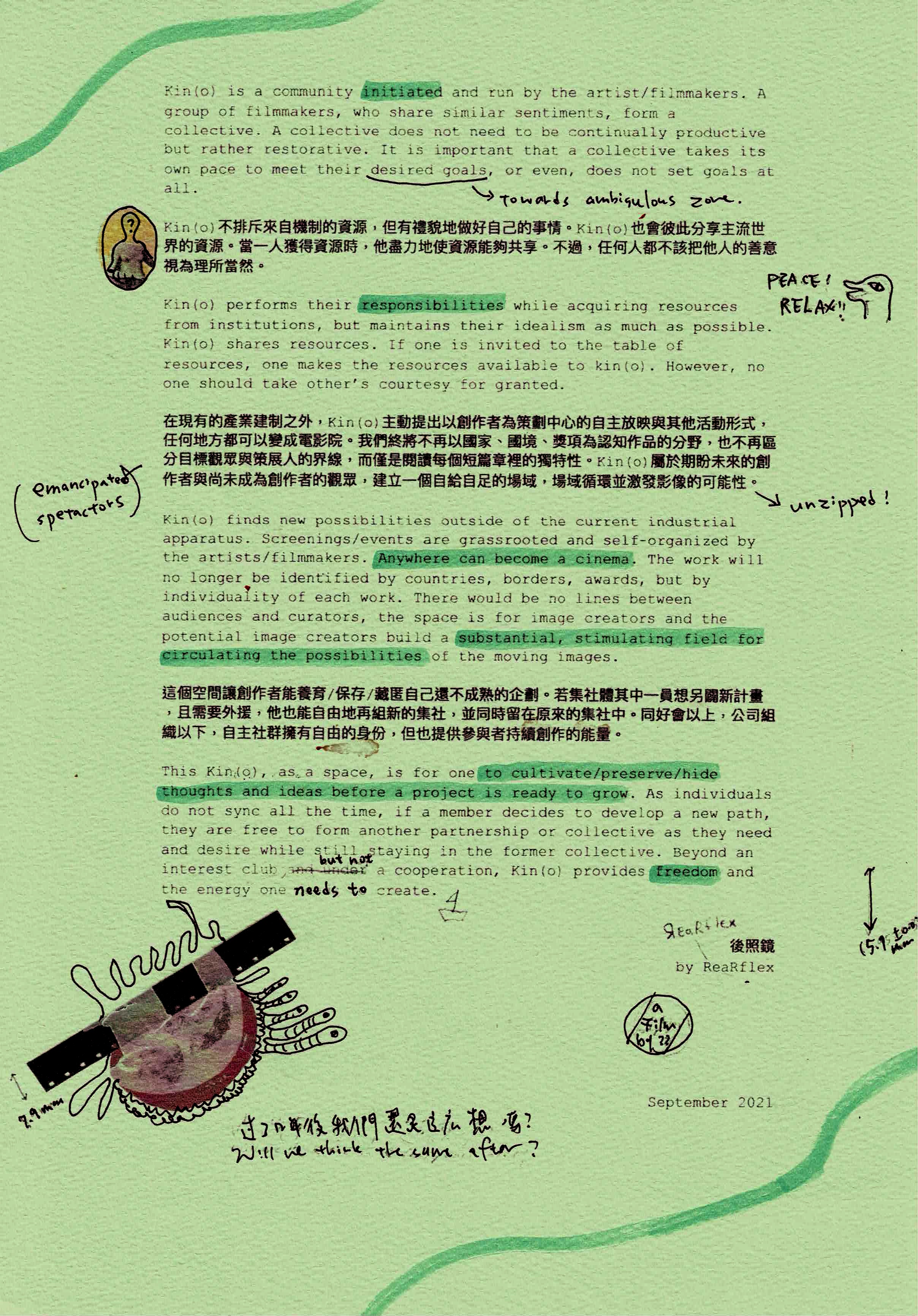 (第二版)
(第二版)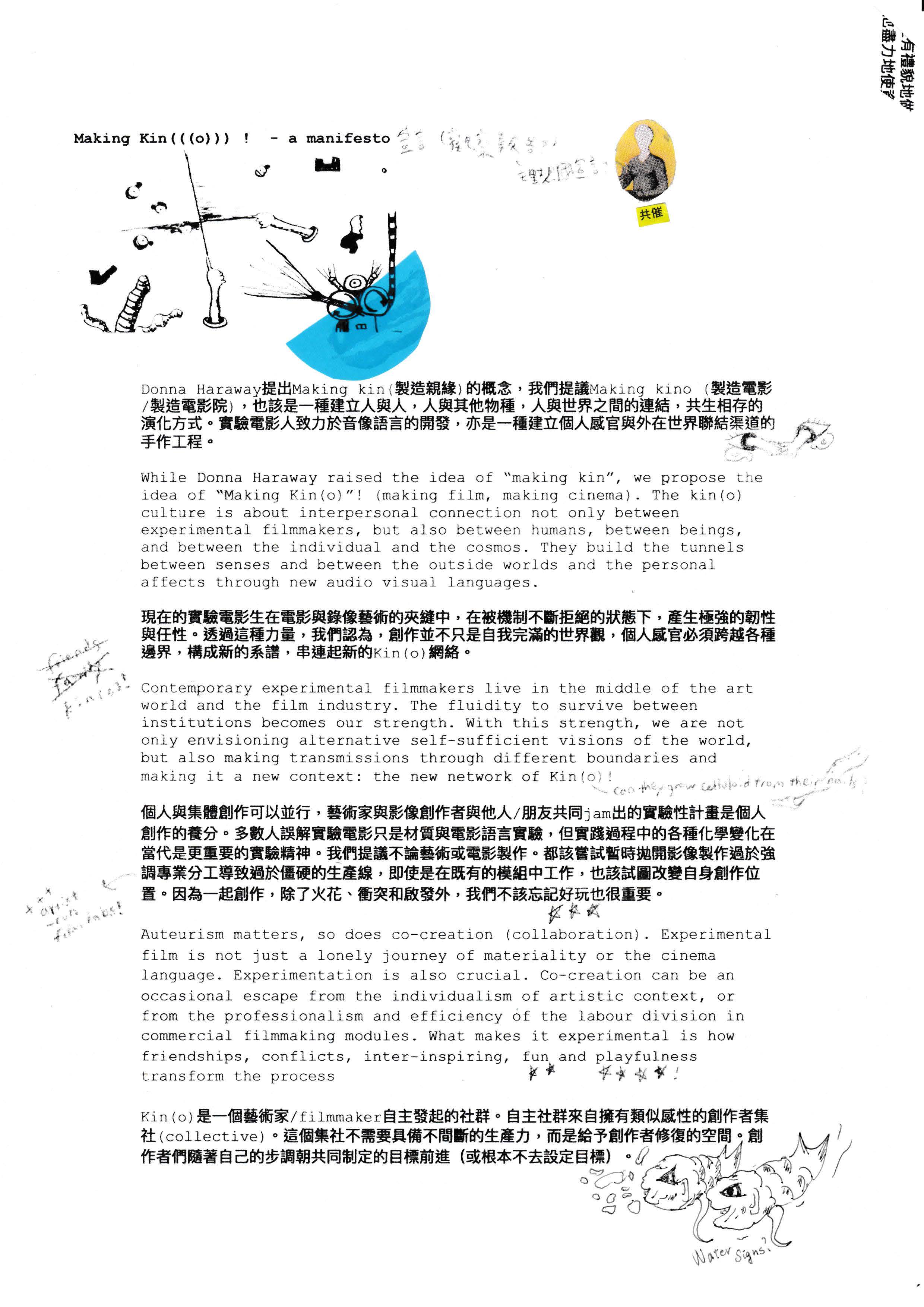
 (第一版)
(第一版)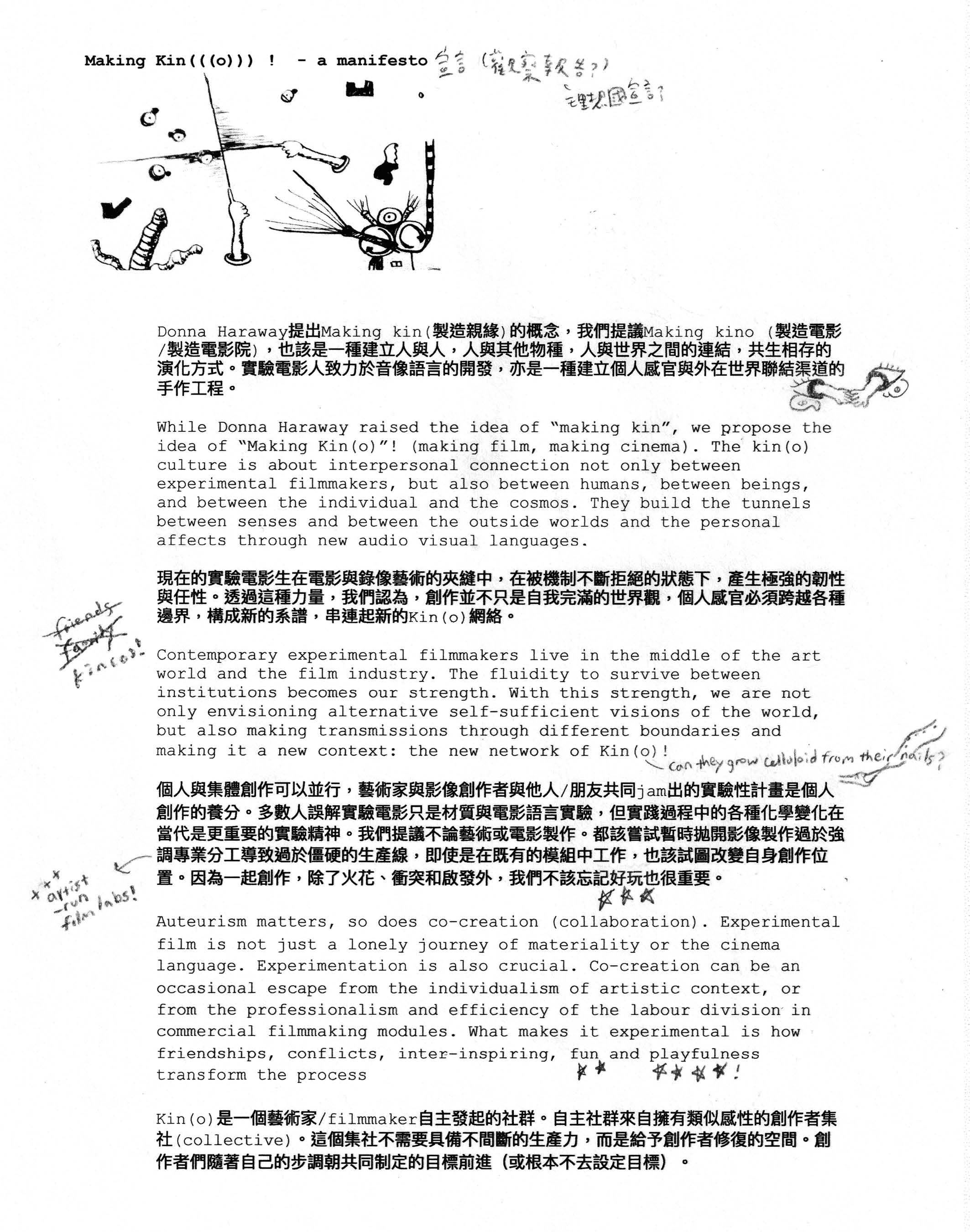
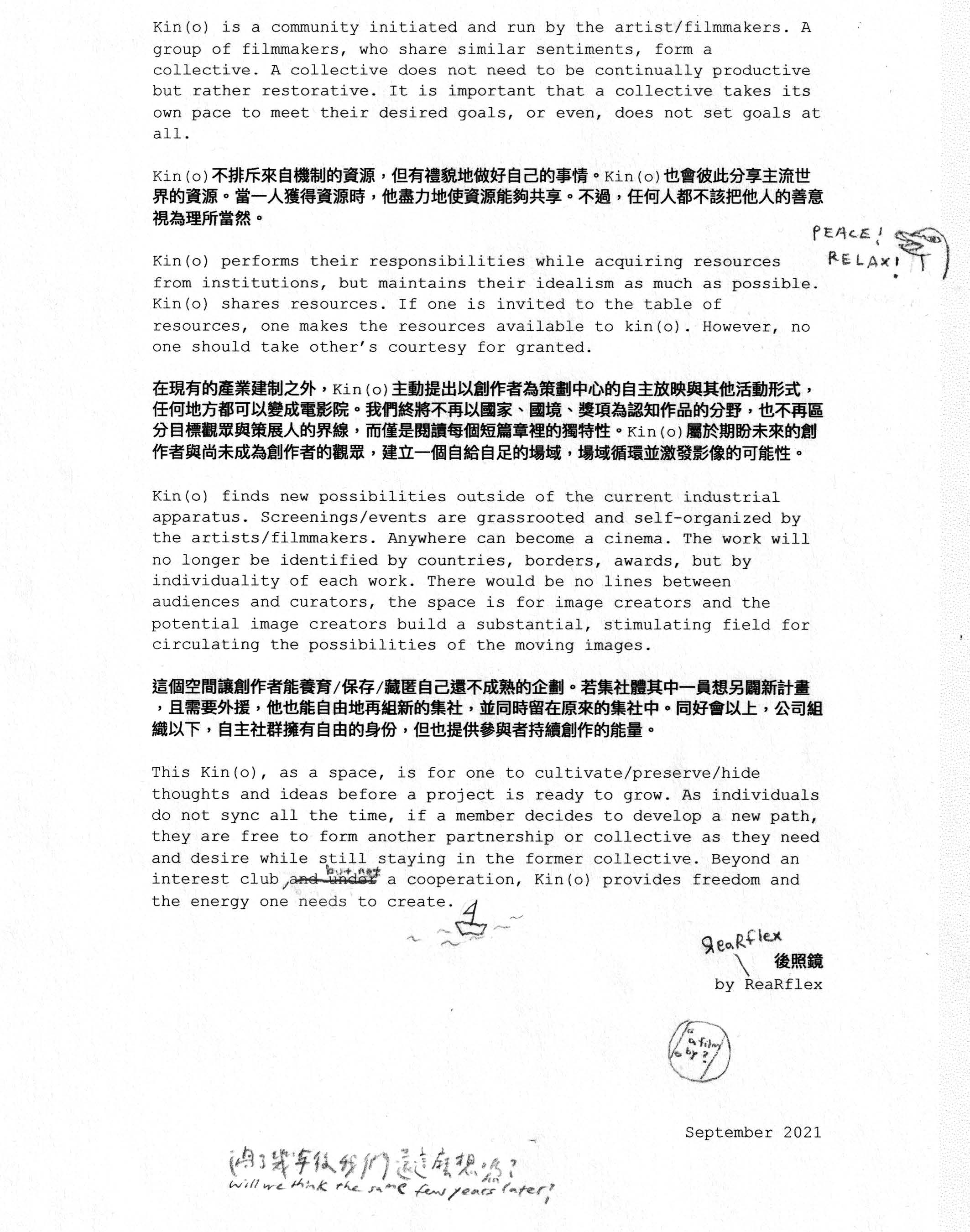
ReaRflex X GLC
台日實驗電影自主放映
➅ 2025/11/22-23
➄ 2024/11/01-03
➃ 2023/11/03-05
➂ 2022/10/23
➁ 2022/04/10
➀ 2021/01/24
台日實驗電影自主放映
➅ 2025/11/22-23
➄ 2024/11/01-03
➃ 2023/11/03-05
➂ 2022/10/23
➁ 2022/04/10
➀ 2021/01/24
Making Kin(o)! Screening & Workshop 工作坊及放映
➉ Lucas Haynes: sleeping at home
➈ 2025南方影展巡迴放映場次三:【禁忌解除——不能忘卻的時代和淚】
➇ 膠卷放映工作坊 Analog Film Projector Workshop
➆ 蔡易錦實驗底片創作分享會 Tsai Yi-Chin
︎ 蒸発書簡 Jouhatsu Letters in Taiwan 張若涵×工藤雅 影像二人展
➅ 麟光四射:林延昭短片放映 LIN Yen-Chao
➄ Declarations of Love / One Big Eye:Tiff Rekem/Benny Shaffer
➃ The Word Was Deleted:Esperanza Collado
➂ 還沒站好就跑起來了:徐璐實驗電影自選集 erica sheu
➁ 曾莉珺專題放映 lichun tseng
➀ Making Kin(o)! Vol. 1
➉ Lucas Haynes: sleeping at home
➈ 2025南方影展巡迴放映場次三:【禁忌解除——不能忘卻的時代和淚】
➇ 膠卷放映工作坊 Analog Film Projector Workshop
➆ 蔡易錦實驗底片創作分享會 Tsai Yi-Chin
︎ 蒸発書簡 Jouhatsu Letters in Taiwan 張若涵×工藤雅 影像二人展
➅ 麟光四射:林延昭短片放映 LIN Yen-Chao
➄ Declarations of Love / One Big Eye:Tiff Rekem/Benny Shaffer
➃ The Word Was Deleted:Esperanza Collado
➂ 還沒站好就跑起來了:徐璐實驗電影自選集 erica sheu
➁ 曾莉珺專題放映 lichun tseng
➀ Making Kin(o)! Vol. 1
collective touring program
Mirror Mirror
The Sentimentalists 濫情者
a slice of my reflection
Fur Film Vol. 2
collective films
Fur Film Series 毛片系列
︎
Manifesto (?)
宣言? (觀察報告?)
Mirror Mirror
The Sentimentalists 濫情者
a slice of my reflection
Fur Film Vol. 2
collective films
Fur Film Series 毛片系列
︎
Manifesto (?)
宣言? (觀察報告?)